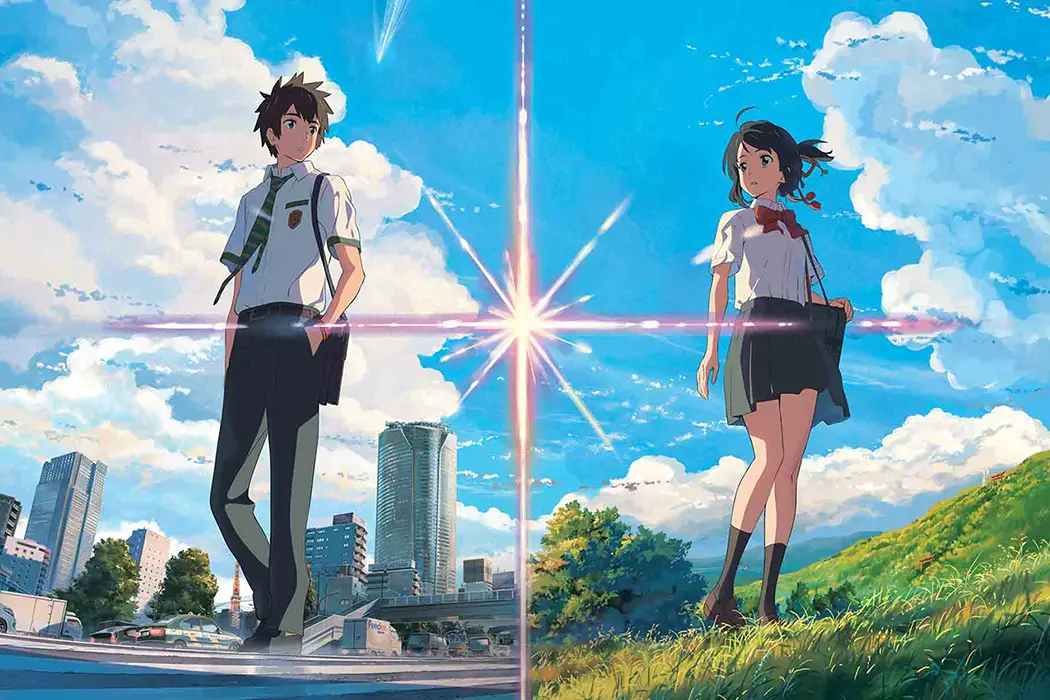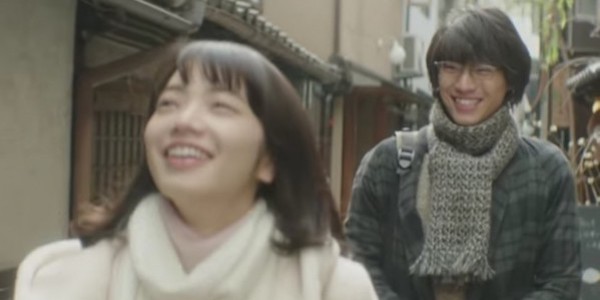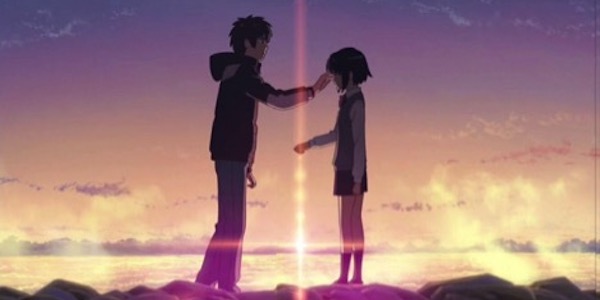Time Travel Dream Girl: Trauma & Romance In YOUR NAME And MY TOMORROW, YOUR YESTERDAY

Michael Colbert is a writer based in Portland, Maine. He…
The Manic Pixie Dream Girl is nothing new. She’s a way for men to project desires onto someone else. She’s mystical and gets the flailing boy-child to grow into functioning boy-child.
Two 2016 Japanese films have different takes on this trope. Enter the Time Travel Dream Girl. The Time Travel Dream Girl is bold, she says what she means, yet she’s secretive. Oh, and she time travels.
Mystical women are by no means nothing new in Japan, from Himiko, shaman queen, to itako, blind women trained to become mediums. My Tomorrow, Your Yesterday (僕は明日、昨日のきみとデートする) and Your Name (君の名は) take up the story of the Time Travel Dream Girl, exploring adolescent romance with a time-leaping twist.
Sugar and Spice and Near-Death Experiences
In My Tomorrow, twenty-year olds Emi and Takatoshi meet on the train and quickly fall for each other once Takatoshi stops her and professes that he’s smitten. With help from his bolder friend, he asks her on a date and everything seems perfect. Music and lighting are dreamy; everything about their interactions is shamelessly saccharine.
For both of them, this is their first time dating, and every step of the way they get consent for everything, from dropping honorifics to holding hands and kissing. Emi is self-assured, telling Takatoshi that it’s okay to do these things, and we see the bashful boy emerge as more confident once she cuts his hair and sculpts him from scruff to man. She’s a bit elusive, and through the beginning she evokes the Manic Pixie Dream Girl in all she leaves unsaid.

The film is marked with different time stamps, and on Day 15 after they sleep together, the perspective shifts: we finally see through Emi’s eyes. She wakes up, and Takatoshi walks her to the train station. She grabs Takatoshi to kiss him goodnight, and he remains off screen. When he returns home, he’s framed through a window, and he gets a mysterious phone call from her.
The shift – underscored by the film’s title appearing on screen – asserts Emi’s agency and notes a traumatic break in narrative. In a story marked by watching Emi, our gaze now falls onto Takatoshi. Once we see from her perspective, the narrative fractures outwards. After Day 15, we learn that Emi comes from another world where her timeline runs opposite to Takatoshi’s. Every five years, the two of them meet, and they are destined to become lovers when they overlap at age twenty.
They’re also destined for more high-stakes work. Both of them have near-death experiences at age five, something we learn of early in the film on one of their first dates. Takatoshi nearly drowns and Emi is almost trampled and abandoned in a fire at a town festival. Both are saved by an older person, which is unsurprisingly the other person at thirty-five.
After this revelation, their narratives become entangled in new ways. Instead of cloyingly sweet, the tone becomes more serious as they understand their obligation to each other. As part of her duty, Emi keeps a journal of everything they did together, recounted by Takatoshi on his last day with her, her first with him. She seeks to ensure they become lovers at age twenty and will sacrifice her own fulfillment for the sake of the relationship. Takatoshi takes issue with this, but in the end they agree.
Takatoshi watches in the latter half of their thirty days as Emi knows less and less about their relationship, and he understands that everything that is his first time is her last. Though the film remains planted in Takatoshi’s perspective, he realizes how selfish the timeline itself is – that it privileges his growth and enjoyment in the relationship more than Emi’s. The narrative structure of the film helps combat the inequality, detailing the relationship from both of their perspectives and repeating scenes as they would occur the first time for Emi.
Body-Swapping, Comet-Dodging
My Tomorrow acknowledges the inequality in the relationship, but Your Name is more egalitarian in its use of time travel.
One morning, Mitsuha wakes up and everything feels a little off. She has boobs that her younger sister catches her groping and she can’t do her hair quite right. While this could be read as discovering bodies in puberty more broadly, Mitsuha and Taki, a boy in Tokyo, have magically begun switching bodies and living each other’s days. Both of them learn about adolescence through their body swapping.
They set up rules to maintain consistency and order in their lives. Though these body shifts are oftentimes comic, both youths help the other out in fundamental ways. Taki has a crush on Ms. Okudera from work, and Mitsuha helps him get a date with her.
And then the body shifts stop, and Mitsuha disappears from the story. Taki begins investigating and travels to a town near Itomori, Mitsuha’s town. As he moves through the countryside and draws closer to Itomori, he learns the town was ravaged by a comet three years ago, a meteor shower he watches from the roof of his Tokyo apartment earlier in the film. He reads about the disaster at the library and finds the names of Mitsuha and everyone he knows in Itomori among those dead. Though we thought Mitsuha and Taki were swapping the same days, Mitsuha exists on a plane three years earlier.
Thankfully, Taki remembers enough of Mitsuha’s life, and he travels to a cave where she, her younger sister, and grandma, offered up kuchikamizake–alcohol with the girls’ hair and spit as part of a shrine ritual. He drinks up, passes out, and they time hop once again in order to evacuate the town.
Taki and Mitsuha meet at twilight on the edge of the crater. They finally get to see each other in person. The sky is stunning, music sweet, and the feelings they’ve developed for the other while living their life are allowed to become something. Taki writes, “I love you,” on Mitsuha’s arm and Mitsuha goes to write her name on his so he’ll remember her.

When she does, the moment ends; the other disappears. And yet, with this extra leap, Mitsuha is able to evacuate the town to safety. The film cuts to five years later. In a voice-over against shots of Tokyo commuters, Taki narrates about always searching for something. And then at the end of the film, he and Mitsuha meet again.
Though Your Name is framed around Taki searching, Mitsuha still acts of her own accord, following her desires to find Taki in Tokyo and similarly yearning for something in life. In the end, she is the one responsible for evacuating Itomori with Taki’s support. For both of them, the body switches and time hops provide them fulfillment, and together they’re able to save the people of Itomori from the comet strike.
The Possibility and Pessimism of the Time Travel Dream Girl
Both Your Name and My Tomorrow offer up delicious possibilities. When lives are at stake, the couple can unite through time to avert disaster. Through realigning in similar worlds, they usurp the power of time. Mitsuha and Taki save Itomori through their time hopping and are able to meet in person in Tokyo. My Tomorrow ends with Emi saying she’s come back to Takatoshi on the train from the film’s beginning, suggesting that somehow the fabric of time has been unraveled.
Where the Time Travel Dream Girl differs from the Manic Pixie Dream Girl, beyond the greater agency of the woman, is through the trauma. In both films, the couple must come to a fundamental understanding of each other and work together in order to undo the disaster. If Takatoshi and Emi don’t follow their prescribed path, neither of them will be rescued by the other as a five-year old. Taki must remember the kuchikamizake in order to summon Mitsuha and enact a time leap prior to the comet striking Itomori.
Resulting from these narratives is the idea that the romance can undo trauma. With atomic bombs, tsunamis, and earthquakes puncturing Japanese history, the Time Travel Dream Girl narrative seems to provide a relief: that through these acts of agency and love, outside forces lose their grip on Japan.
And yet, underneath the saccharine love, the rooftop parties and chance subway encounters is a bleaker message. Only in this counterfactual in which the trauma is negotiable can this sort of love exist. In a world without time travel and bending reality, this sort of love remains unattainable.
Have you seen either of these films? Do you think there are other cases of the Time Travel Dream Girl?
Does content like this matter to you?
Become a Member and support film journalism. Unlock access to all of Film Inquiry`s great articles. Join a community of like-minded readers who are passionate about cinema - get access to our private members Network, give back to independent filmmakers, and more.
Michael Colbert is a writer based in Portland, Maine. He loves horror film (his favorites are Candyman and Rosemary's Baby), and he’s a coffee addict (his favorites are Costa Rican and Ethiopian). His work has appeared in Avidly, Maine the Way, and Germinal.













